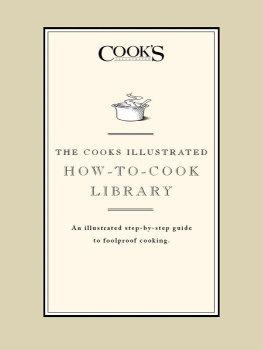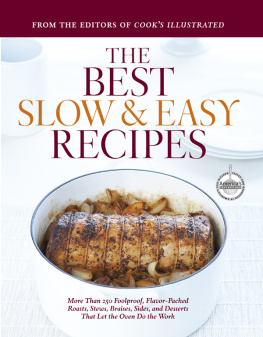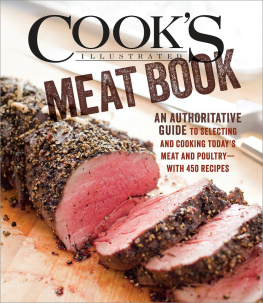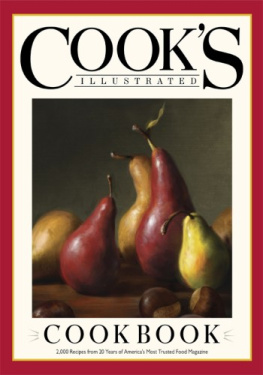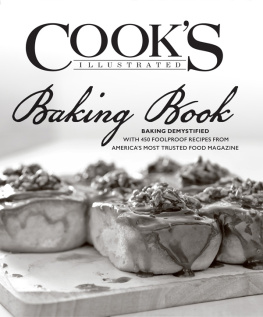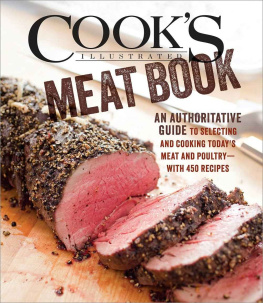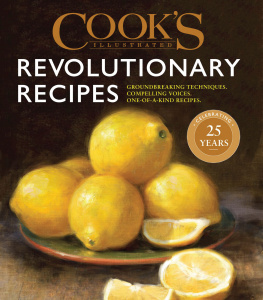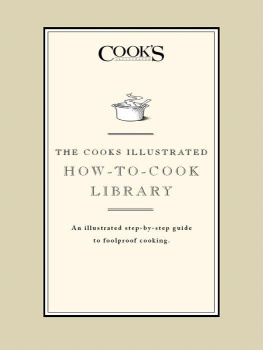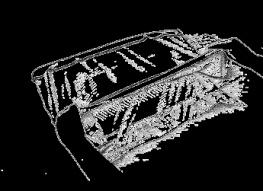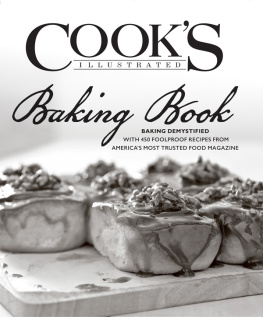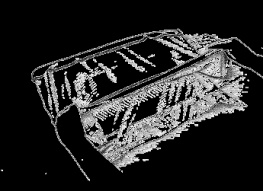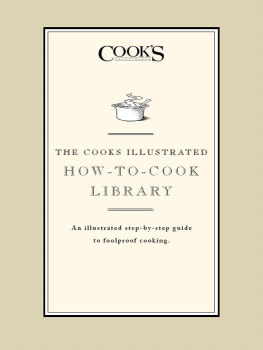Cooks Illustrated - The Cooks Illustrated How-to-Cook Library
Here you can read online Cooks Illustrated - The Cooks Illustrated How-to-Cook Library full text of the book (entire story) in english for free. Download pdf and epub, get meaning, cover and reviews about this ebook. genre: Home and family. Description of the work, (preface) as well as reviews are available. Best literature library LitArk.com created for fans of good reading and offers a wide selection of genres:
Romance novel
Science fiction
Adventure
Detective
Science
History
Home and family
Prose
Art
Politics
Computer
Non-fiction
Religion
Business
Children
Humor
Choose a favorite category and find really read worthwhile books. Enjoy immersion in the world of imagination, feel the emotions of the characters or learn something new for yourself, make an fascinating discovery.
- Book:The Cooks Illustrated How-to-Cook Library
- Author:
- Genre:
- Rating:3 / 5
- Favourites:Add to favourites
- Your mark:
- 60
- 1
- 2
- 3
- 4
- 5
The Cooks Illustrated How-to-Cook Library: summary, description and annotation
We offer to read an annotation, description, summary or preface (depends on what the author of the book "The Cooks Illustrated How-to-Cook Library" wrote himself). If you haven't found the necessary information about the book — write in the comments, we will try to find it.
Cooks Illustrated: author's other books
Who wrote The Cooks Illustrated How-to-Cook Library? Find out the surname, the name of the author of the book and a list of all author's works by series.
The Cooks Illustrated How-to-Cook Library — read online for free the complete book (whole text) full work
Below is the text of the book, divided by pages. System saving the place of the last page read, allows you to conveniently read the book "The Cooks Illustrated How-to-Cook Library" online for free, without having to search again every time where you left off. Put a bookmark, and you can go to the page where you finished reading at any time.
Font size:
Interval:
Bookmark:
An illustrated step-by-step guide to foolproof cooking.
By the Editors of C OOK'S I LLUSTRATED
Illustrations by John Burgoyne

Brookline, Massachusetts
Copyright 2009 by The Editors of Cook's Illustrated
All rights reserved. No part of this book may be reproduced or transmitted in any manner whatsoever without written permission from the publisher, except in the case of brief quotations embodied in critical articles or reviews.
America's Test Kitchen
17 Station Street
Brookline, Massachusetts 02146
The Cook's Illustrated How-to-Cook Library
An illustrated step-by-step guide to foolproof cooking
The Editors of Cook's Illustrated
Special Kindle Edition
e-ISBN: 978-1-933615-45-5
Editorial Director: Jack Bishop
Design Director: Amy Klee
Cover Design: Greg Galvan
Cover Art and Illustrations: John Burgoyne
Recipe Development: Julia Collin Davison, Melissa Hamilton, Bridget Lancaster,
Elizabeth Germain, Kay Rentschler, Anne Yamanaka, Dawn Yanagihara
There are all sorts of cookbooks out there. Some have 2,000 recipes, others have 200. Some are packed with color photos, others black and white. Some are nothing more than recipes, others are part of a narrative describing a life or place. But I am still struck by a comment made to me over 20 years ago by a Swedish friend and cook, who offered this advice, "It's not how many recipes, it's which recipes." Sometimes expertise turns up where you least expect it, as in the story I'd heard about a New York couple who purchased a farm in Vermont back in the 1930s. Instead of using the local surveyor to check the property lines, they hired an expensive firm out of the city so they would get a top-notch job. Three men showed up, but after two days of work they still could not find the last corner. The firm finally had to admit defeat and ask for help from the local surveyor, who, in no time at all, found the spot in question. The New York firm received a bill a few days later for $100. They wrote back indicating that they needed the work itemized since the bill was a bit pricey. The new invoice came by return post: "Twenty-five dollars for finding the corner and $75 for knowing where it was."
The notion of "knowing where it was" is the founding principle for our "How-to-Cook" library. Knowing the best way to produce tender stew meat; knowing the best techniques for preheating a skillet or seeding a tomato; knowing whether Dutch-processed cocoa is better than natural in a particular recipeyears and years of test kitchen work all contributed to this unique collection. Each chapter contains a definitive repertoire of recipes, only the ones you really want and need, recipes tested and developed here at America's Test Kitchen. These are small jewels, just the thing when you want to make a pasta sauce, layer cake, holiday dessert, or mashed potatoes, or when you want to roast, grill, stew, bake, saut, or stir-fry.
Every cook has a repertoire, the key recipes that are appealing, practical, useful, and interesting enough to keep in the rotation. To this day, my wife, Adrienne, swears that the Chicken Noodle Soup recipe is the best she has ever made, and we make it for dinner at least twice a month. Or the Ham and Split Pea Soup, Oven Fries, Fruit Cobbler with Butter Cookie Dough Topping, Grill-Roasted Chicken, Quick Lasagne with Meatballs, or the French-Style Potato Salad. These are the staples of our weeknight menus. Sure, in this day and age, access to virtually millions of recipes is right at your fingertips through the Web. But who needs millions of recipes that might or might not work? What any home cook wants are recipes that work, the first time and every time.
I have always believed that the best way to make a good cook is to give them a good recipe. These are recipes that don't have to be second-guessed, fixed up, or changed around if you don't have a convection oven, are cooking on an electric rather than a gas stovetop, or are using the wrong size skillet. That's our job, to figure out what might go wrong with a recipe and engineer it for the best possible chance of success in your kitchen, with your cookware.
So enjoy this very special Kindle collection of recipes. It is not available anywhere else. It covers all the culinary ground, from barbecue, grilling, garden vegetables, holiday roasts, potatoes, soups, stews, stir-fries, pasta sauces, pizza, appetizers, salads, shrimp and shellfish, to pies, layer cakes, cookies and brownies, holiday desserts, ice cream, simple fruit desserts, and lots more. It's all you really need in the kitchen and it all sits nice and handy on a Kindle as well. Now your own definitive recipe collection is portable and easy to access, the perfect helper in the kitchen. Just remember to invite us over for dinner!
Christopher Kimball
Founder and Editor
Cook's Illustrated and Cook's Country
Host, "America's Test Kitchen" and "Cook's Country From America's Test Kitchen" on PBS
T HE DICTIONARY DEFINES APPETIZER AS "a food or drink that stimulates the appetite." The French word hors d'oeuvre is translated as "apart from the work," and the Italian antipasto literally means "before the meal." Both are synonyms for appetizer and refer to the fact that these little fingers foods are eaten away from the dining table, often on the hoof. At a cocktail party, appetizers can be a meal unto themselves.
For this book, we have tested countless recipes for appetizer favorites from around the world, finally selecting the versions that taste best and require the least amount of work. In general, we have limited hands-on work to no more than 20 minutes for each recipe, plus baking and cooling times. Wherever possible we have provided do-ahead instructions to keep the cook out of the kitchen during the party.
The book is divided by the main ingredient in the appetizer (eggs, vegetables, meat, etc.). Within each chapter, we start with the recipes that are the easiest and quickest to make. Recipes at the end of each chapter tend to be a bit more complicated.
DECIDING HOW MANY APPETIZERS TO MAKE
The question we hear most often about appetizers concerns quantity. How many types of appetizers and how many pieces are required? The answer depends how long you plan to serve the appetizers and what follows. Some examples.
If you plan a short cocktail hour (let's say 45 minutes, while you wait for all of your guests to arrive) followed by a multicourse meal, you want to serve just one to two appetizers. (If you are expecting a large crowd, you might consider making three appetizers.) Plan on three or four pieces per person if you plan on one hour or less for cocktails. For more than one hour, make at least two appetizers and plan on four to six pieces per person.
A true cocktail party (with no dinner to follow) requires more types of appetizer and more pieces. In many cases, guests drink for several hours and some may even make a meal out of the appetizers. In this case, you want to serve at least five or six appetizers and should plan on at least 10 to 12 pieces per person.
Dips can be used to supplement the above recommendations, or, for a simple appetizer, you can serve a single dip and some crudits (raw vegetables) and skip the individual pieces.
Take into account how heavy and filling the appetizers you have chosen are. Guests are likely to be satisfied by two or three pieces of rolled beef but might want four or five large shrimp with cocktail sauce.
CHOOSING SPECIFIC APPETIZERS
Font size:
Interval:
Bookmark:
Similar books «The Cooks Illustrated How-to-Cook Library»
Look at similar books to The Cooks Illustrated How-to-Cook Library. We have selected literature similar in name and meaning in the hope of providing readers with more options to find new, interesting, not yet read works.
Discussion, reviews of the book The Cooks Illustrated How-to-Cook Library and just readers' own opinions. Leave your comments, write what you think about the work, its meaning or the main characters. Specify what exactly you liked and what you didn't like, and why you think so.

